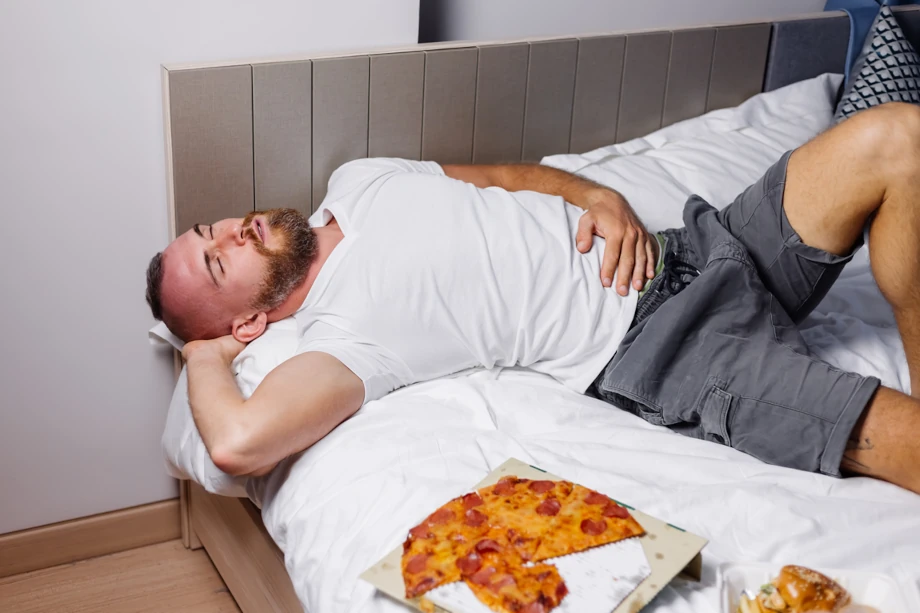It is said that some people eat to live whilst others live to eat.
Easy access to food in the developed countries contributed to a more common occurrence of eating to decrease negative emotions. Many studies have led to a term being coined of ‘emotional eating’. It is diagnosed when food is consumed (often unconsciously) as a way of coping with negative emotions (fear, feeling down, loneliness or anger). Acquiring pleasure by consuming food to eliminate unwanted emotions can be harmful in a similar way to consuming alcohol, drugs, gambling or compulsive sex.
Obviously, there is nothing wrong when eating food brings us pleasure. The problem begins when it is habitually consumed to decrease feelings of sadness, loneliness or other unwanted reactions. Emotional eating is a common problem and occurs in many healthy people who do not have any mental disorders. However, it is almost always a present occurrence in patients with eating disorders.
How to tell the difference between physiological hunger and emotional hunger?
We need food every day. It serves to satisfy hunger and it is needed for energy. Having a meal is like a ritual, which enables us to spend time pleasurably with other people, making friends and maintaining friendships. We are talking here about the social aspect of eating. A problem arises when we go through kitchen cupboards and the refrigerator in search of food even though we are not hungry. Such sudden urge of eating something occurs despite having eaten a normal meal. In comparison to emotional hunger, physiological hunger grows gradually. Usually, we feel physiological hunger only after a few hours after eating the last meal. There is a characteristic feeling of emptiness in the stomach and audible ‘rumbling’ is heard. Physiological hunger will subside with each eaten mouthful. In case of emotional eating, it is difficult to reach a feeling of satiety – in reality, we often eat much more than our body needs.
Moreover, in emotional eating:
- you can feel sated only when we feel our stomach is full; in this obvious way we learn we cannot be hungry anymore.
- even if we feel sated, compared to other people this feeling of satiety disappears much quicker.
What is compulsive overeating?
Emotional eating is almost a constant feature of psychic bulimia and compulsive overeating syndrome. What is compulsive overeating? Compulsive overeating syndrome is one of the eating disorders. From the second half of 20th century is recognized as an individual illness. In USA Binge Eating Disorder (BED) it is the most common diagnosed eating disorder. It is estimated that it can affect up to 2.8 million Americans.
International classification of diseases ICD 10 which applies in Poland since 1992 didn’t distinguish this illnessas a separate category defined as compulsive overeating syndrome. This had an impact on low rates of diagnosis of this syndrome in our country. For many years sick people didn’t find appropriate help or due to accompanying obesity they were met with rejection and aversion from medical personnel.
Compulsive binge eating syndrome particularly in women usually starts in teenage years or early adulthood. On the other hand, in men, it starts in middle age. Compulsive overeating can affect anyone of us at any age. Noticing the problem at an early stage allows necessary steps to be taken quickly. Sudden pangs of hunger, especially in the evening with subjective feeling of loss of control over food. Lack of satiety irrespectiveof the food consumed Eating very quickly during attacks of hunger as opposed to normal eating. The loss of control over the quantity and quality of consumed food, especially when you are on your own. Reaching for something to eat when you experience sadness, anger or depression. Lack of compensatory behaviours typical for bulimia nervosa such us making yourself vomit or using laxatives, practicing excessive physical exercise.
Compulsive overeating syndrome affects 3 TIMES MORE people than anorexia and bulimia combined!
Compulsive overeating – where does it come from?
The most important problem which makes the sick person to devour foodis treating food as a way of coping with stress and emotions. That is precisely why compulsive binge eating is called ‘eating emotions’. Consequently ,this leads to loss of control over the quantity of food one consumes. It is some sort of form of distraction from negative emotions or a form of compensating for difficult experiences. Eating problems can start in early childhood, when we form habits that food is a reward or consolation. Later in life, we use this argument ourselves, when despite the of feeling of fullness, we reach for another portion. Controlling emotions by eating does not bring the desired effects. Stress and strong emotions do not subside, and we reach for another mouthful.
Compulsive overeating can be rooted in different emotional problems of patients. Common causes include (among others):
- lack of abilityto cope with difficult situations
- defusing tension in a wrong way
- Too restrictive diet
What will a psychologist ask me when diagnosing compulsive binge eating?

To diagnose compulsive binge eating, a psychologist will have to ask you several questions. Before you go to the appointment you can establish some details, which will be helpful.
- First, consider when exactly the eating problems started
- What happened in your life at that time?
- How often do you get hunger pangs? What accompanies them?
- Does eating during negative emotions bring you a sense of relief?
- Do you provoke vomiting after binge eating?
When patient eats emotionally – what does the treatment look like?
Compulsive overeating requires a comprehensive approach to the patient and preferably the cooperation of a psychologist, a nutritionist and a doctor. Appropriate therapy will be implemented in a patient who reports problems with hunger pangs and lack of control over consumed meals. It involves working on the emotions which accompany the strong temptation to eat. Preparing a menu which will meet the patient’s needsand alsosimultaneously teaching them basic eating habits. Medical care is essential to control laboratory tests andprevent sugar and fat disorders which maybe the result of improper diet.
Jak dostać się do naszego Ośrodka?
Jeśli interesuje Cię nasza oferta lecznicza i diagnostyczna, zapraszamy do naszego Ośrodka IN-MED, jesteśmy na Bemowie, ulica Pełczyńskiego 5 lok 78 w Warszawie.

